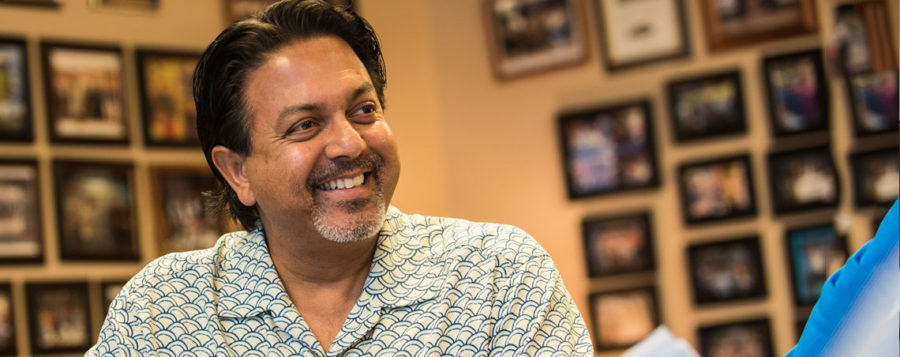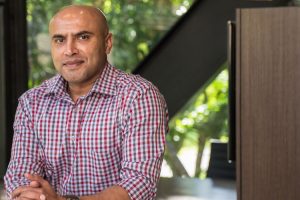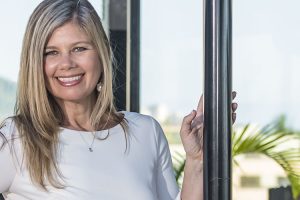Approachable, quick to laugh and with a background in women’s swimwear and parking management, Sanj Sappal isn’t someone you’d expect to find in the security business. But upon meeting him, it’s easy to see how his warm personality, infectious enthusiasm and high-touch approach to management has inspired record levels of employee retention in an industry notorious for its high turnover rate.
As it turns out, the skillset that brought Sappal success selling bikinis and managing parking lots has translated remarkably well to this latest chapter in his noteworthy, if eclectic, career. Still, Sappal himself would never have guessed he’d end up at Securitas, a global leader in electronic security, corporate risk management, and mobile, remote and on-site guarding.
As area vice president for Securitas’ Hawai‘i and Guam region, Sappal is responsible for overseeing one of the corporation’s largest North American outposts and rolling out a slew of proprietary security solutions pioneered by what is collectively one of the largest providers of protective services in the world. Here, he discusses the challenges and intricacies of managing a network of more than 2,000 employees as the largest security company and eighth largest employer in the state.
What did you do prior to your career at Securitas?
I owned and operated retail stores for a good 12 years. My mom first got me into it—she’s run Cosmopolitan Sun Shop, her store at Koko Marina Center, for 40 years—so after graduating from Chapman University in 1987, I came back to Hawai‘i and borrowed the funds to open two women’s swimwear shops in Kailua.
During that time, I was simultaneously involved in parking management. At one point I reported to Sidney Kim, a hotel security chief and retired inspector for the Honolulu Police Department. He introduced me to a lot of other retired police officers working in hotel security, who I eventually started golfing with. The golfing led to more relationships and friendships, and I later met Securitas’ former area vice president Ray Romero. When Ray decided to retire, the president at the time convinced me to step in. I didn’t know anything about security. I was selected based on my relationships in the industry.
HOw would you describe your leadership style?
I’m definitely not management by fear. If that’s your approach, your organization is just going to have a revolving door. My style is management by motivation—and maybe a little fear!
How long has Securitas been a contractor for the state?
We’re on our third term of providing security services for the state’s 11 airports. Each term is about five years, so we started in 2004 and currently employ about 1,100 airport security employees. It’s a $43 million-per-year contract, and it accounts for about half of our business.
How do you maintain a positive brand reputation when handling complaints or other incidents that could result in negative publicity?
I think the most important thing is to be honest, humble and as transparent as possible. We share what we can with the media, but we also have to respect the individual’s rights in terms of labor laws and HR rules and regulations.
What qualities have helped get you to where you are today?
Being caring and compassionate with people has allowed me to build trust and friendships with people I wouldn’t otherwise have relationships with. Internally it’s allowed me to gain the trust and loyalty of my staff.
Managing a company that serves as the first responder in a lot of challenging and sometimes life-threatening situations, nothing ever surprises me. I’ve built a thick skin and learned not to react when provoked. That’s a useful skill when conflicts arise. It’s important to respect others’ opinions and deal with things in a professional manner.
How have current events affected the work that you do?
Current events and even social media have changed the security industry dramatically. We’ve all become very vigilant of our surroundings. As a result, our company is using technology to create force multipliers. Cameras can cover more area than one guard with two eyes. Security is definitely a fast-paced industry, and it will only continue to grow, fortunately and unfortunately.
What about cyberattacks?
Securitas purchased Pinkerton in 1999 and Burns Security in 2000, two of the oldest and largest guarding companies in the United States. We do cyber security through our Pinkerton acquisition. There’s a lot of fraud taking place, so we’ve been involved in corporate risk management as an industry leader this whole time.
What has Securitas been involved in lately on the national level?
Securitas recently acquired Diebold’s North American electronic security business—it’s now Securitas Electronic Security—so we’ve created a lot of proprietary technologies involving cameras triggered by motion or sound. A lot of home security systems are equipped with this feature. So if there’s an intrusion in your backyard while you’re away, your security system captures a ten-second clip and sends it to you wherever you are.
In California, we teamed up with a Silicon Valley technology company to deploy about 25 robots capable of license-plate recognition, and they’re moving into facial recognition next. We’re also teaming up with Microsoft and another tech company to explore applications for augmented reality.
These are all developments within the past year or so, so we’re just out of the gate. We’re currently working on getting up to speed on a new remote monitoring center, which we have here locally. We’re learning a new industry, really.
Technology is really changing the way we’re driving our business. I would say 90 percent of our 300-plus contracts utilize SecuritasVision, a proprietary smart phone and tablet-based platform that streamlines officer walk-arounds and incident reports. Other companies have their own technology, but we think we’re driving most of it.
In what capacity is Securitas involved in the hospitality industry?
We have guards all over Waikiki, especially now with our mobile patrol service. We’re very vigilant and are in close contact with the police department, which is good for the tourism industry when you look at it on a macro level. We save lives, mitigate situations, we take people off the plane. Last year we responded to over 10,000 incidents at the airports alone.
We’re here to protect the state of Hawai‘i and that’s what motivates me each day. We’re the first and last encounter for visitors coming to Hawai‘i, so we put our guards through a tremendous amount of aloha-spirit training. We really try to exemplify the aloha spirit while also keeping people safe. That’s an incredibly difficult thing, but we try to be ambassadors of aloha and instill that throughout our whole management team.
How has the state’s low unemployment rate affected business?
That’s a big challenge we’re facing right now. Everyone is looking for workers. We hired a recruitment specialist earlier this year to attract and retain new hires because, as of this interview, we’re 160 guards short.
We also launched a program where our HR department calls on individual guards to check in about the onboarding process, how their manager is treating them, whether or not they have the uniforms they need. We never did that when the unemployment rate was high. We should have, and we’re going to continue to do so. We currently offer new employees a $1,000 sign-up bonus or $1,500 if they carry a state-issued guard card.
This industry is all metrics driven, so we’re always comparing ourselves to other regions when it comes to overtime, workers’ comp, gross margins, net profit and more. One of the most interesting comparisons we’ve found is that we have one of the highest officer-retention levels among Securitas locations throughout the United States. Last week we were number one in the nation. We’re also in the top 10 for lowest officer turnover. I think that can be attributed to the fact that we try to stay very close to our staff, take care of their needs and treat them like ‘ohana.
Why is community outreach such a significant part of your business?
What we do here is pretty unique, but that’s just the nature of Hawai‘i. There’s only 660,000 employable workers in the entire state. Compare that to San Diego County’s 1.5 million or the 22 million in downtown Los Angeles. If you don’t stand out the right way, you’re going to stand out like a sore thumb the wrong way.
I think it’s very important to connect with our clients. That’s something I’ve driven here. You’re building lifelines—that’s an analogy I use to ensure we have good retention of contracts as well as employees. We have to take care of everybody and give back to the community here. The islands are too small not to.




